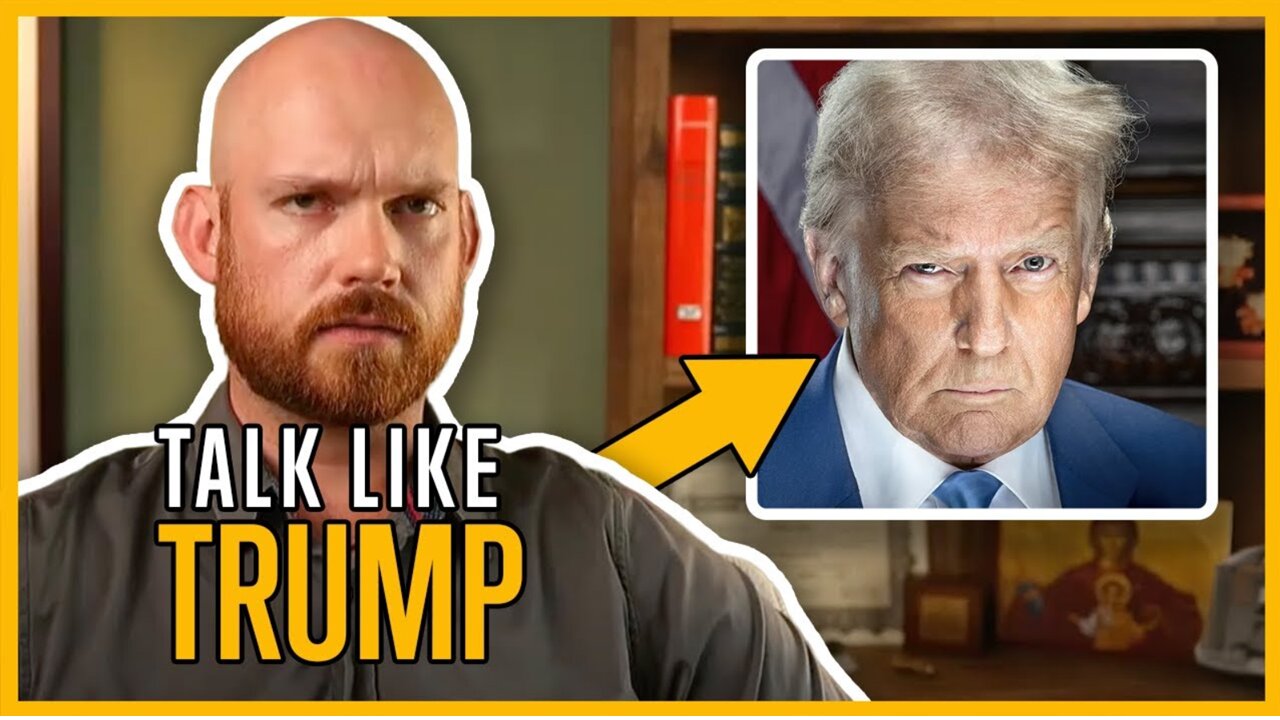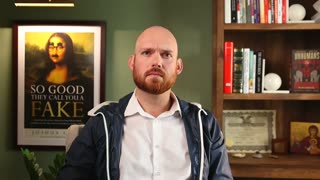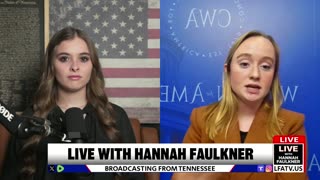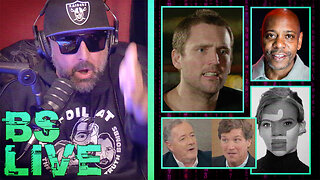Premium Only Content

How to Talk Like Trump & Persuade Everyday People ft. NO Declaration of War—Daily Persuasion Ep. 332
Would you like to write a persuasive BOOK? One that changes minds and influencers behavior for years to come? Start with a GOLDEN book idea. Let NEW YORK TIMES bestselling author Joshua Lisec teach you: https://lisecghostwriting.com/golden
ABOUT TODAY'S EPISODE:
What if the secret to persuasive speaking wasn’t found in ancient rhetoric or MBA jargon—but in children’s books? In Daily Persuasion with Joshua Lisec Ep. 332, titled “How to Talk Like Trump & Persuade Everyday People ft. NO Declaration of War,” Lisec breaks down what makes Donald Trump’s rhetoric the most effective—and the most misunderstood—form of persuasion psychology in modern politics.
Everyone says Trump rhetoric is “for the common man,” that it’s “simple,” even “uneducated.” But Lisec proves that’s not a flaw—it’s the technique. In this Daily Persuasion episode, Lisec dissects a viral Trump quote about “NO Declaration of War,” which spread online after an Aaron Rupar edit. What looks like a blunt, even outrageous remark—“We’re going to kill them. They’re going to be like dead.”—is actually a masterclass in simple language persuasion.
Lisec explains how Trump’s style mirrors the rhythm and structure of children’s stories, like The King with Six Friends (1968). Short sentences. Simple words. A dash of irony. And yet, immense emotional power. This is persuasion in motion. By comparing a Trump quote to the first page of a children’s book, Lisec shows how persuasive techniques work not by complexity, but by clarity. The fewer syllables you use, the more neurons you trigger.
And then comes the Rupar edit. Lisec pulls apart how Aaron Rupar and similar media figures edit videos to frame soundbites—creating what he calls “the illusion of meaning.” When Aaron Rupar edits a Trump clip, the goal isn’t accuracy—it’s emotional persuasion through omission. The Rupar edit takes one or two sentences, removes the setup and conclusion, and leaves behind a caricature. Yet ironically, that same process reveals how persuasion techniques can both expose and distort truth.
Throughout Daily Persuasion Ep. 332, Lisec connects these linguistic patterns to persuasion examples across media, politics, and advertising. What makes Trump rhetoric powerful isn’t rage—it’s rhythm. Every “we’re gonna” and “believe me” hits like a drumbeat. The techniques of persuasion in writing—parallelism, repetition, irony—translate perfectly to speech. And just like in examples of persuasion in advertising, emotional simplicity outperforms logical sophistication every time.
Lisec reminds viewers that persuasion psychology isn’t about manipulation—it’s about resonance. The secret to how to persuade people isn’t in sounding smart; it’s in sounding familiar. When people hear words they already understand, trust follows automatically. It’s why Donald Trump’s “NO Declaration of War” comment lands powerfully with his audience: it sounds like something they’d say at the dinner table, not something written by a speechwriter.
Lisec calls this “linguistic mirroring,” a persuasive speaking technique that works across all audiences. Whether you’re a writer, marketer, or leader, mastering simple language persuasion can make your message 10x more impactful. Want to know how to persuade someone to do something? Start by stripping away the fluff. Replace “initiate hostilities” with “fight back.” Replace “strategic objectives” with “win.” Replace “complex messaging strategy” with “tell the truth plainly.”
Lisec also explores persuasion examples in political history, showing how presidents from Clinton to Reagan used the same persuasive techniques in subtler forms. The difference, he says, is that Donald Trump weaponized clarity. In an age when everyone else is hiding behind corporate jargon, he speaks like a children’s book—and that’s precisely why people listen.
By the episode’s end, Joshua Lisec gives viewers practical persuasion tips they can apply immediately: how to simplify your own writing, how to use irony without sarcasm, and how to make your audience feel like you’re speaking directly to them. He explains how persuasion psychology turns small linguistic choices into large emotional outcomes—and why authenticity beats articulation every time.
Daily Persuasion with Joshua Lisec Ep. 332: “How to Talk Like Trump & Persuade Everyday People ft. NO Declaration of War” isn’t about politics—it’s about power. The power to connect, influence, and lead through language.
If you’ve ever wondered why some voices command millions while others fade into noise, this is the episode to watch. Lisec doesn’t just analyze Trump rhetoric—he teaches you how to use persuasive speaking the right way. No deception. No manipulation. Just language that moves people.
Watch now, and discover how to persuade people—with the same clarity and confidence that wins elections, sells ideas, and changes minds.
-
 12:07
12:07
Daily Persuasion with Joshua Lisec
10 days agoThe Vivek Ramaswamy Conspiracy ft. Scott Adams Trump Predictions — Daily Persuasion Ep. 341
251 -
 9:28
9:28
ThatStarWarsGirl
1 day agoSupergirl Trailer REACTION!
41.4K5 -
 LIVE
LIVE
Lofi Girl
2 years agoSynthwave Radio 🌌 - beats to chill/game to
352 watching -
 3:06:46
3:06:46
Boxin
4 hours agoBoxin + Moogsical RV There Yet!? Take 2! (special guest?)
13.9K -
 28:03
28:03
The Hannah Faulkner Show
2 days ago $0.59 earnedCWA Study Finds Shocking Content in Netflix Shows | LIVE WITH HANNAH FAULKNER
7.77K3 -
 31:45
31:45
The Heidi St. John Podcast
2 days agoFan Mail Friday: Faith, Discernment, and Keeping Christ at the Center
2.95K -
 39:10
39:10
The Bryce Eddy Show
2 days ago $0.40 earnedFresh Mouth Club: Exposing the Dental Industry’s Biggest Lie
2.22K1 -
 14:55
14:55
Nikko Ortiz
1 day agoI Laugh I Go To Hell...
61.7K12 -
 9:36
9:36
MattMorseTV
19 hours ago $46.01 earnedTrump’s TOLERANCE has just RUN OUT.
128K172 -
 1:39:31
1:39:31
Sam Tripoli
1 day ago $21.59 earnedBroken Sim: Owen Benjamin Was Right + Candace Owens' Background + Idiotic Comedian Rankings
31.6K22